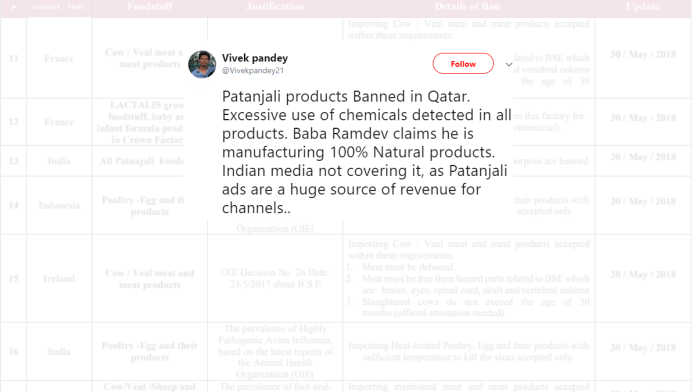The post claims Qatar banned Patanjali products after finding ‘excessive chemicals’ in all of them. MP Shashi Tharoor said it ‘was serious, if true’.
New Delhi: Thousands of Twitter users are sharing a letter purportedly from the Qatar ministry of public health to allege that products of Baba Ramdev’s Patanjali have been banned in the West Asian country.
The original post, made Tuesday by Vivek Pandey, who identifies himself as a whistleblower, suggests the products were banned by Qatar following the detection of “excessive chemicals” in all Patanjali offerings.
With this claim, Pandey sought to question Patanjali’s USP, which is that it manufactures organic products. The letter he attached in the post was in Arabic, and ThePrint couldn’t immediately verify its contents.
Patanjali products Banned in Qatar. Excessive use of chemicals detected in all products. Baba Ramdev claims he is manufacturing 100% Natural products. Indian media not covering it, as Patanjali ads are a huge source of revenue for channels.. pic.twitter.com/kuyG7kzLg8
— Vivek pandey (@Vivekpandey21) October 9, 2018
By Thursday afternoon, the post had been retweeted 3,900 times. Congress MP Shashi Tharoor was among those who shared it, saying “this is serious if true”. On Tharoor’s timeline, the post received a further 2,700 retweets.
this is serious if true. https://t.co/UGnJVzBjoN
— Shashi Tharoor (@ShashiTharoor) October 9, 2018
While it’s true that Patanjali products did face a ban in Qatar this year, it wasn’t because of chemicals, but the fact that the Muslim nation requires ‘halal’ certification for the foodstuff marketed there.
Also read: Hi-tech fence on Indian border that social media is celebrating is actually in Israel, US
On 30 May, the Qatar ministry of public health issued a list of products from different countries banned for import. In this list, the only Indian export was “all Patanjali foodstuff”.
As Pandey’s post went viral, on Wednesday, Patanjali spokesperson S.K. Tijarawala issued a clarification on Twitter, saying the allegation was “misleading”.
News of ban on #patanjali Products in @qatar is misleading..
Look yourself in the light of attached documents:
1. NOC by Qatar Govt.
2. Eng translation of NOC
3. Notification clearly showing that Halal Certificate was demanded
4. Halal Certificate of #Patanjali
Products@ANI pic.twitter.com/3AcROMZkIA
— Tijarawala SK (@tijarawala) October 10, 2018
According to him, in November last year, Patanjali submitted to Qatar a halal certificate signed by an organisation named the Jamiat Ulama-i-Hind Halal Trust, Delhi, whose certification in the matter is recognised by the country.
A month after the ban was imposed, Patanjali requested Qatar for a no-objection certificate (NOC) to export its products to the country.
Also read: Video about milk adulteration in India actually shows technique to produce white phenyl
According to the letter shared by Tijarawala, the Qatar government responded, saying it would issue an NoC only if Patanjali provided a halal certificate for all its products. It’s not known whether the ban has been revoked yet.
With inputs from Himani Chandna
An earlier version of the report said Congress MP Shashi Tharoor’s post had received 5,400 retweets, when it had actually received 5,400 likes and 2,700 retweets by Thursday afternoon. The error is regretted.







Shashi Tharoor is a man of controversy. Hmind is full of negativity. He enjoys being controversial.
I have no political inclinations but the title of this article is outright absurd. While sharing the tweet he has clearly mentioned that it is serious ‘if true’. But your title just talks about him sharing the fake tweet. I’m finding it hard to understand whether this kind of journalism is unethical or merely poor.